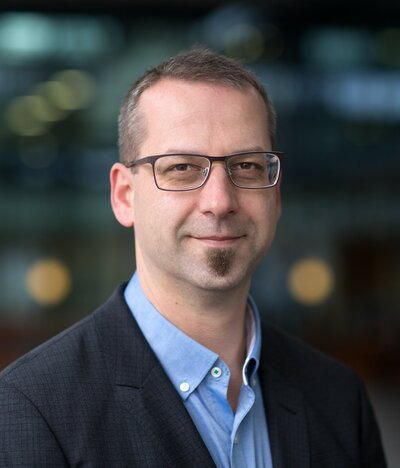Heiner Friedrich
Department / Institute
Group

RESEARCH PROFILE
The research of Heiner Friedrich focusses on the fundamental aspects of chemical and physical processes relevant to the hierarchical structuring of materials. The aim hereby is to improve functional performance by morphology optimization and to provide sustainable solutions based on abundant or renewable resources. Of special interest are functional networks made from primary building blocks and achieving local control over network formation and resulting multiscale topology. Materials examples include porous silica/silicate with tunable mass-transport properties for separation and catalysis applications; and graphene composites with tunable energy-transport properties for printed electronics and heat transport/storage applications. To create such functional networks with truly hierarchical morphologies we combine bottom-up self-organization and top-down (additive) manufacturing approaches. To gain insight into morphology evolution during formation, operation, degradation and, prospectively, recycling of the material we utilize quantitative microscopy (QM). To advance QM we also develop (big data) cryo & in-situ electron microscopy approaches for the dynamic investigation of materials over multiple length and time scales.
Matter does not matter, morphology is everything.
ACADEMIC BACKGROUND
Heiner Friedrich received his master’s degree in physics in 2001 from TU Dresden (GER) under supervision of professor Hannes Lichte with a specialization in particle and wave optics. From 2002 to 2005 he worked at Arizona State University (USA) developing electron tomography for materials science. He then moved to Utrecht University (NL) where in 2009 he obtained his PhD (cum laude) in the fields of inorganic chemistry, catalysis and quantitative electron microscopy under supervision of professors Krijn de Jong and Arie Verkleij. In 2009 he started part-time as a junior assistant professor at the Inorganic Chemistry and Catalysis group of Utrecht University and as a postdoctoral researcher in the Laboratory of Materials and Interface Chemistry of TU Eindhoven, where he was appointed as full-time assistant professor in 2011. Currently, he works as scientific staff member at the Laboratory of Physical Chemistry since 2019 and is leading the electron microscopy facility of the Department of Chemical Engineering and Chemistry since 2018. He acts as the TU/e executive board member of the Dutch Electron Microscopy Infrastructure (NEMI).
Key Publications
-
Laura S. van Hazendonk,Artur M. Pinto,Kirill Arapov,Nikhil Pillai,Jean Pierre Teunissen,Asko Sneck,Maria Smolander,Corne H.A. Rentrop,Piet C.P. Bouten,Heiner Friedrich
Printed Stretchable Graphene Conductors for Wearable Technology
Chemistry of Materials (2022) -
E. Deniz Eren,Massimiliano Chiappini,Mark M.J. van Rijt,Alexander F. Routh,Marjolein Dijkstra,Gijsbertus de With,Nico Sommerdijk,Heiner Friedrich,Joseph P. Patterson
Spontaneous organization of supracolloids into three-dimensional structured materials
Nature Materials (2021) -
Mohammad Soleimani,Lambèrt C.A. van Breemen,Sai P. Maddala,Rick R.M. Joosten,Hanglong Wu,Ingeborg Schreur-Piet,Rolf A.T.M. van Benthem,Heiner Friedrich
In Situ Manipulation and Micromechanical Characterization of Diatom Frustule Constituents Using Focused Ion Beam Scanning Electron Microscopy
Small Methods (2021) -
Hanglong Wu,Hao Su,Rick R.M. Joosten,Laura S. van Hazendonk,Maarten J.M. Wirix,Joseph P. Patterson,Jozua Laven,Gijsbertus de With,Heiner Friedrich
Mapping and Controlling Liquid Layer Thickness in Liquid-Phase (Scanning) Transmission Electron Microscopy
Small Methods (2021) -
A.J. (Remco) Fijneman,Joakim Högblom,Magnus Palmlöf,Gijsbertus de With,Michael Persson,Heiner Friedrich
Multiscale Colloidal Assembly of Silica Nanoparticles into Microspheres with Tunable Mesopores
Advanced Functional Materials (2020)
Current Educational Activities
Ancillary Activities
No ancillary activities